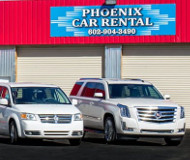Article from: www.thenewspaper.com/news/64/6431.asp
3/28/2018
Arizona Court Upholds Constitutionality Of Rental Car Tax
Arizona judges rule that the drivers of rental cars are not road users and are therefore their tax dollars can be used to fund a sports stadium.
 Does the state of Arizona have the constitutional power to tax rental car drivers to pay for the construction of sporting arenas? The state Court of Appeals earlier this month said yes, it does.
Does the state of Arizona have the constitutional power to tax rental car drivers to pay for the construction of sporting arenas? The state Court of Appeals earlier this month said yes, it does.
Arizona currently imposes a five percent tax on the net cost of renting an automobile with an Arizona license plate. The law forces rental car companies to keep detailed paperwork on every rental transaction so that the state Department of Revenue can verify the amount collected. On top of this levy, Maricopa County approved its own 3.25 percent surcharge specifically to pay for the $455 million University of Phoenix Stadium, home of the Arizona Cardinals football team and the Fiesta Bowl.
The problem with that arrangement, however, is that Section 14 of the state constitution states that fees or taxes on vehicles may only be used for "highway and street purposes." Voters enacted the provision in 1952 to prevent diversion of motorist funds to government projects that did not benefit drivers. The three-judge appellate panel pointed out that the state had been taxing rental cars since 1935.
"From the inception of that statewide car-rental business tax, and at the time Section 14 was adopted, proceeds from the tax were not reserved for highway uses but went instead to the state's general fund," Judge Diane M. Johnsen wrote.
There was no complaint about the car rental tax in the pamphlet sent to voters at the time the ballot initiative was adopted, the ruling claimed. So the panel decided to make a distinction between the driver of a rental car and a "road user."
"The taxable event that triggers the surcharge is the rental of a vehicle, not its operation or use," Judge Johnsen ruled. "While most every car-rental transaction will result in the customer using the car on public highways or streets, the surcharge is imposed regardless of whether, how much or how often the customer drives the car."
The court inferred that this was what the voters wanted when they adopted the anti-diversion measure. It also pointed out that striking down the use of the rental car tax for stadiums would also affect the taxes on car sales and auto repair because those motorists funds are also diverted to the general fund.
"In sum, contrary to Saban's contention, Section 14's text, context and history teach that the voters did not intend it to encompass every tax or fee in any way 'relating to' vehicles," Judge Johnsen ruled. "Instead, we conclude Section 14 applies to a tax or fee that is a prerequisite to, or triggered by, the legal operation or use of a vehicle on a public thoroughfare."
The court also saw no problem with using the rental car tax as a way to primarily raise money from out-of-state visitors since in-state renters also have to pay the levy.
A copy of the ruling is available in a 450k PDF file at the source link below.
Source: Saban Rent-a-Car v. Arizona Department of Revenue (Court of Appeals, State of Arizona, 3/13/2018)
Permanent Link for this item
Return to Front Page
 Does the state of Arizona have the constitutional power to tax rental car drivers to pay for the construction of sporting arenas? The state Court of Appeals earlier this month said yes, it does.
Does the state of Arizona have the constitutional power to tax rental car drivers to pay for the construction of sporting arenas? The state Court of Appeals earlier this month said yes, it does.